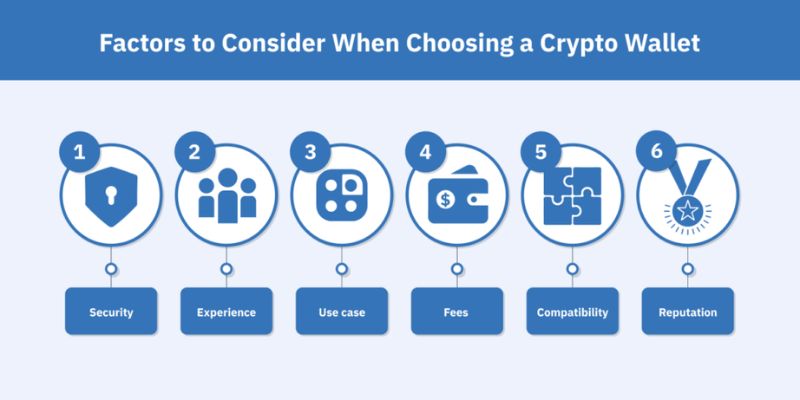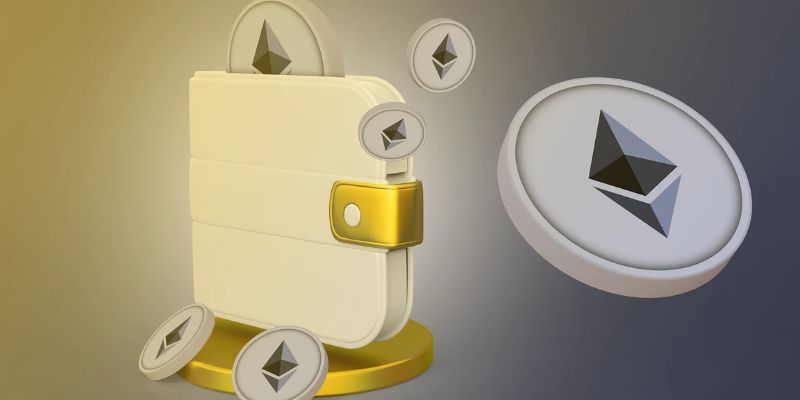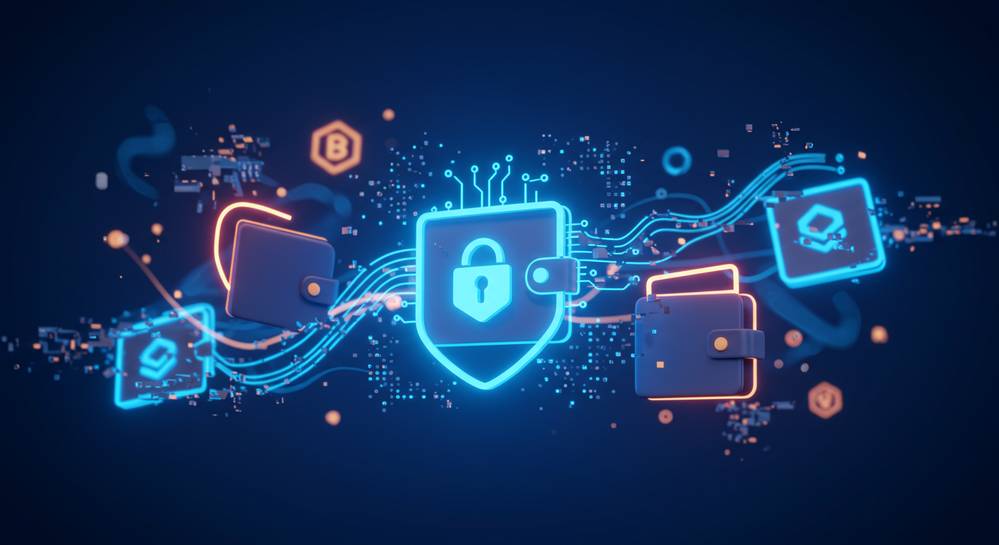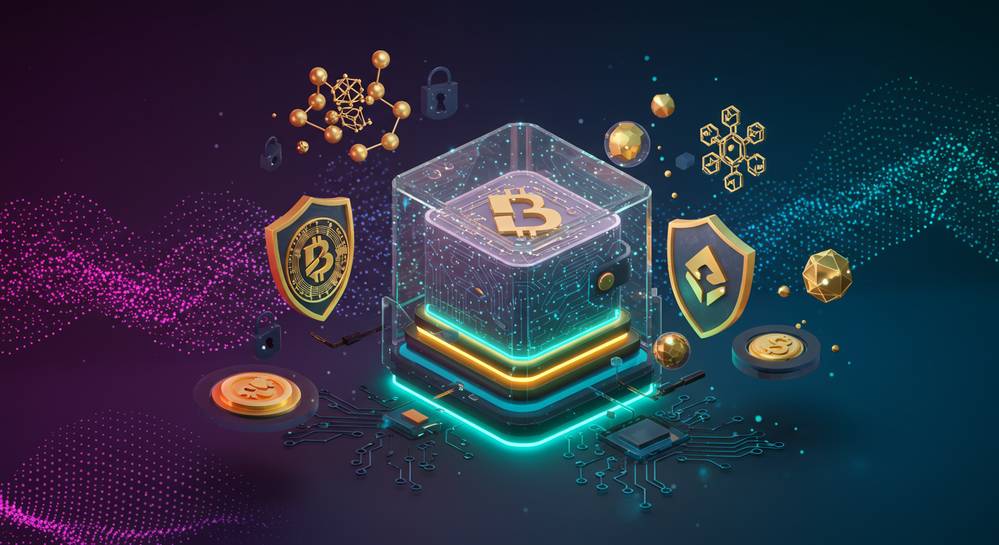Important features to consider when choosing a crypto wallet are crucial to keeping your digital wealth safe and sound. You wouldn’t just stuff your cash under any old mattress, right? Your crypto deserves the same smarts! Let’s dive into the nitty-gritty of wallet security, access, storage types, and the extra bits that make a wallet worthy. Get ready to sift through our ultimate guide and find the perfect vault for your virtual coins!
Understanding Crypto Wallet Security Essentials
Emphasizing the Importance of Crypto Wallet Security Features
Let’s kick things off by diving into the world of crypto wallet security features. Think of your crypto wallet like a digital bank vault. You wouldn’t want a bank vault that’s easy to break into, right? The same goes for crypto wallets. These features keep your digital treasure safe from hackers and sneaky thieves.
Now, suppose someone asks, “Why are crypto wallet security features important?” The answer is straightforward: to protect your money from theft or loss. Without tight security, you risk losing your hard-earned crypto to cybercriminals or making mistakes that could empty your virtual pockets.
Security features range from basic to advanced. Some wallets offer two-factor authentication. This adds an extra step to verify it’s really you trying to get in. Imagine a secret handshake with your wallet. It’s just between you two. Next, we have multisignature wallets. They require more than one key to unlock your funds. It’s like needing two people to turn launch keys for a missile – extra secure.
The Necessity of Wallet Encryption Standards and Secure Private Key Storage
Next up, let’s chat about wallet encryption standards and secure private key storage. “What’s that?” you might ask. Wallet encryption is a way to scramble your wallet’s info so only someone with the key can read it. It’s like passing secret notes in class that only your best friend can decode.
When you set up a new wallet, you get a private key. This key is a big secret code that lets you into your wallet. It’s like the only key to a treasure chest. Secure storage means keeping your key somewhere safe. It can be a tough memory game, or you might write it down and lock it up.
Many people worry about losing their private key. That’s where a seed phrase comes in. It’s a list of words that can help you get back into your wallet if you forget your key. Think of it as a treasure map that leads back to your digital gold.
What’s the big deal with choosing a wallet that’s easy to use? “What’s in it for me?” you might wonder. Well, imagine you’re using a new gadget. If it’s hard to use, you might get fed up and quit. The same is true for wallets. If they’re tough to understand, you might make mistakes or ditch them completely. A good wallet feels like a friendly helper, not a puzzle.
In the end, you’d want wallet options for your computer and phone. You might want your wallet to work on many blockchains. You’d also want to check how often the wallet updates. You need updates to stay safe and sound. Customer support can also save the day if you hit a snag.
Just remember, the more you know about crypto wallet security, the better you can keep your digital dollars safe. It’s like learning the rules to a new game. The better you know them, the more likely you are to win. And in this game, winning means keeping your crypto safe and sound. Keep an eye on those security features, and you’ll be a crypto vault master in no time!

The Crypto Wallet Access Conundrum: Balancing Security and Convenience
Two-Factor Authentication and Multisignature Wallets Explained
When picking a crypto wallet, security is key. I’m sure you’ve asked, “How do I keep my crypto safe?” The short answer: use wallets with two-factor authentication (2FA) and multisig. 2FA adds a second check, like a text code, to your login. Multisig requires more than one person to okay a transaction.
Let me dive deeper. Two-factor authentication for wallets means needing two types of proof to access your coins. This can be something you know, like a password, plus something you have, like your phone. Multisignature wallets explained simply are like a bank safe that needs two keys to open. They need more than one private key. This means you and others control the wallet together.
Now, why does this matter? With these features, thieves can’t just take your password and get your crypto. They need your phone for 2FA, or your friends’ keys for multisig. It’s not foolproof, but it ups the safety by a lot.
Hot Wallet vs Cold Wallet: Comparing Accessibility Features
What’s easier to grab, a snack from the fridge or one from a store miles away? That’s like choosing hot wallets for quick use or cold storage wallets for safety. Hot wallets are online and easy to access, like a fridge snack. Cold wallets are offline, more like that distant store snack, but safer from hackers.
So what should you choose? Well, it depends on how you use your crypto. If you buy and sell a lot, a hot wallet’s quick access is great. But if you’re saving, go for a cold wallet’s security. Think of a hot wallet as your daily spending money in your pocket, and a cold wallet like your savings account at the bank.
Hardware wallet benefits come into play here. They’re a type of cold wallet that look like USB sticks. Unlike online software wallets, they’re harder to hack since they’re offline. But software wallet convenience isn’t all bad. They’re often free and very easy to use with your computer or phone.
So, are you after top-level security or fast and easy access? Remember, you can have both types for different needs. It’s all about finding that sweet spot between keeping your crypto safe and making it simple to use when you want to.
Now, what’s crucial is the backup. Always have a seed phrase backup ready. This is a list of words that can restore your wallet if you lose it. Store it safe and never share it with anyone. This is your last line of defense if things go south.
This isn’t just about tech know-how. It’s about peace of mind. Knowing your wallet is secure lets you focus on the fun part—watching your crypto grow. And, let’s not kid ourselves, the thrill of joining in on the future of money!

Comparing Storage Solutions: Hot, Cold, Hardware, or Software?
Cold Storage Wallets: Ensuring the Safety of Digital Assets
When you dive into crypto, security tops the list. Cold storage wallets are like safe boxes for your digital coins. They keep your assets offline, away from hackers. Imagine it like keeping your jewels in a safe rather than out on your dresser. With cold storage, since they are not connected to the internet, the risk of online theft drops to nearly zero. This makes them great for holding crypto long-term. To access your coins, you simply plug the device into a computer.
So, how do you pick a cold wallet? Look at how it lets you recover your assets if things go south. Make sure your cold wallet lets you backup your data. Secure private key storage is also key – like not letting anyone know the code to your safe. Also, check for support for different blockchains; you want a wallet that fits all your assets, not just some.
Hardware Wallet Benefits Over Software Wallets for Enhanced Security
Now, think about hardware wallets. They are a form of cold storage but look like USB sticks. They keep your keys safe in a physical form. You just connect them to your computer when you need to make a transaction. With hardware wallets, your private keys never touch your computer, keeping them safe from online threats.
Why choose them over software wallets? Here’s the deal: hardware wallets offer stronger security. They are built to resist virus attacks that might try to steal from software wallets. Plus, they are super portable, unlike your desktop, and usually easy to use. Think of it as having a secure keychain for your digital money.
Software wallets might be simpler to use, though, since they are just apps on your device. They are usually free and quick to set up. They’re also with you as long as you have your phone or laptop, so they’re good for day-to-day spending.
But remember, software wallets require internet access, which means more risk. It’s like leaving your house door unlocked while you’re home. You’re there, but it’s easier for someone to sneak in.
To keep your crypto safe, think about how much you have and how you use it. For savings, hardware and cold storage are best. For spending cash, software wallets are more convenient. And always, always look for a wallet that allows you to back up your data. It’s like having a spare key to your house, just in case.
No matter what you pick, encrypt your wallet and use a long, unique password. And remember, the best wallet is the one that fits your needs and keeps your crypto secure. So now that you know the difference, which one feels right for you?
Additional Considerations for Crypto Wallet Selection
Understanding the Seed Phrase Backup Importance and User-Friendly Interfaces
Imagine losing your phone with all your photos. That hurts, right? Now picture if your phone held all your crypto. That’s scary! That’s why you write down your seed phrase. Your seed phrase is a list of words that unlocks your crypto wallet. It’s like a secret code to get back what’s yours.
You must keep this seed phrase safe. It’s as important as the key to your house! Tell no one and hide it well. A safe or a locked drawer? Perfect spots! If someone finds it, they can take your crypto.
Now, who likes things easy to use? Everyone! Wallets should be simple to set up and use. They should work on phones and computers with clear instructions. Look for wallets with easy steps to send, receive, and check your crypto without a headache.
Wallet Integration with Exchanges and Wallet Reputation and Trust Factors
Where do you buy crypto? On exchanges! But can you move it to your wallet? Yes, if they work together. This team-up makes life easy. When choosing a wallet, ask, can it connect to where I buy crypto? This means less hassle moving your coins.
Trust is huge. Before you pick a wallet, do your homework. Read reviews and check their history. A good wallet has happy users and few problems.
Keep these tips in mind and you’ll find a wallet that’s right for you. It’s your money, so choose wisely!
We’ve covered a lot about keeping your crypto safe. Your wallet’s security is critical. Pick the right wallet—balance security with ease of use. Remember, hot wallets are easy to use, but cold wallets keep your assets safer. Hardware beats software for security.
Two-factor and multisig help lock down your crypto. Don’t forget, your private keys must stay private. And always back up your seed phrase.
When choosing, look for wallets that work well with exchanges and have a strong trust record. Your digital cash matters. Protect it like you would your real wallet. Pick smart, stay safe!
Q&A :
What are the top security features to look for in a crypto wallet?
When selecting a crypto wallet, security should be your top priority. Key features to evaluate include two-factor authentication (2FA), multi-sig functionality which requires multiple keys to authorize a transaction, and hardware wallet support for offline storage of private keys. Look for wallets that undergo regular security audits and provide a transparent security protocol.
How can the user experience of a cryptocurrency wallet affect my choice?
User experience is crucial, especially for those new to cryptocurrency. The wallet should have an intuitive interface, straightforward setup process, and should not be overly complex in performing transactions. Consider wallets that offer customer support and educational resources. Compatibility with multiple cryptocurrencies and ease of account recovery are also important factors.
What should I consider regarding wallet accessibility and compatibility?
Before choosing a crypto wallet, determine the types of devices you’ll use to access your funds. Make sure the wallet is compatible with your smartphone, desktop, or tablet. Additionally, consider if the wallet supports the cryptocurrencies you are interested in and whether it allows easy integration with exchanges or is compatible with other wallets.
Does the backup and restoration process matter when choosing a cryptocurrency wallet?
Absolutely. Backup and restoration features are vital for the resilience of your crypto assets. A good wallet will offer a secure backup mechanism, such as a recovery phrase, to restore your funds in case of device loss or failure. Understand the backup process and ensure that it is straightforward and that you’re able to perform backups regularly.
How does wallet privacy and anonymity features affect my crypto transactions?
Privacy and anonymity vary across different wallets. Some offer enhanced privacy features like address changing for every transaction, which provides increased anonymity. Assess the level of privacy you require and investigate whether the wallet uses central servers, how it handles transaction data, and if it requires personal information to register or perform transactions.



